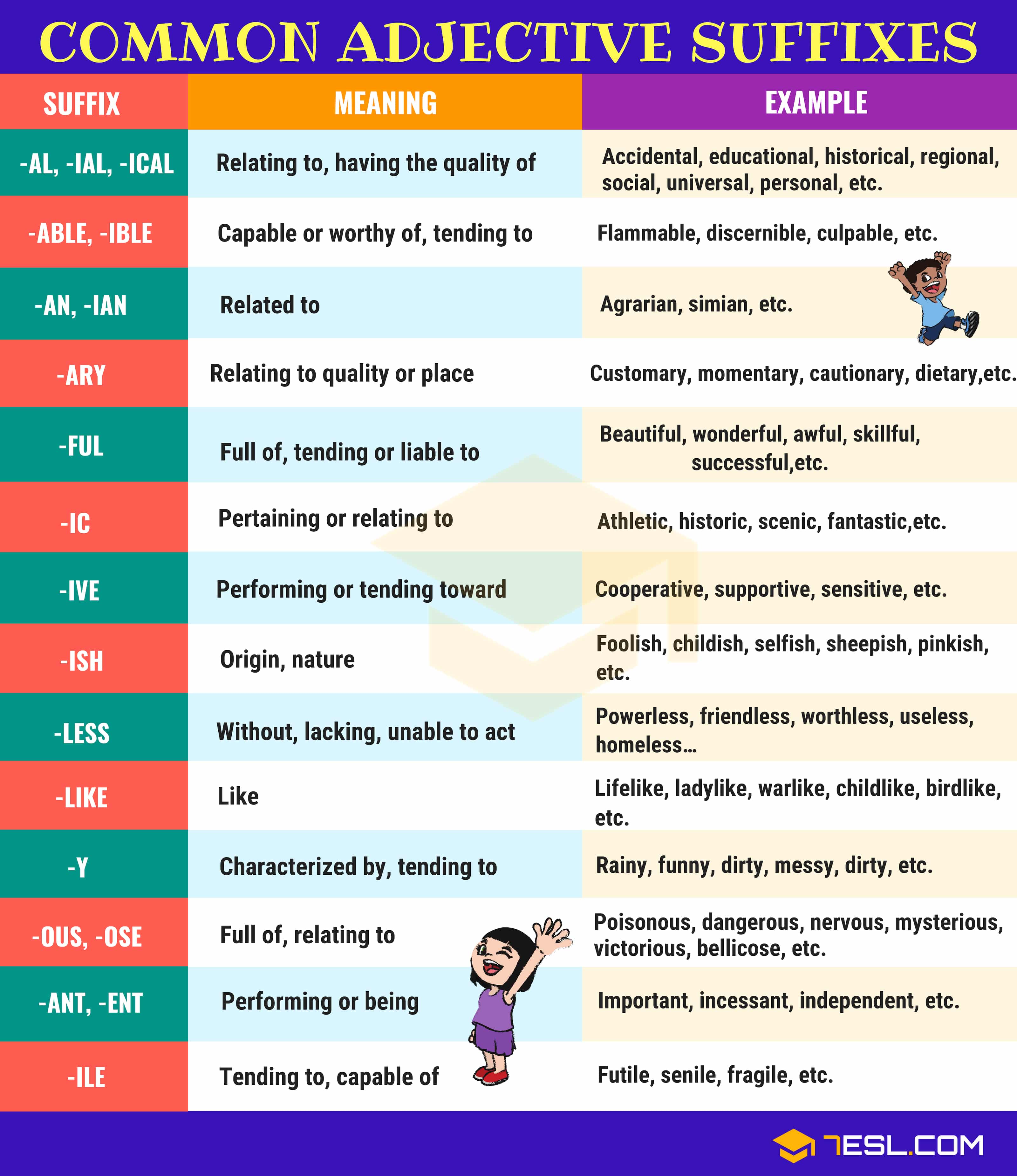
Table of Contents
What Is an Adjective?
An adjective is a word that describes a noun or pronoun such as person, place, thing or idea.
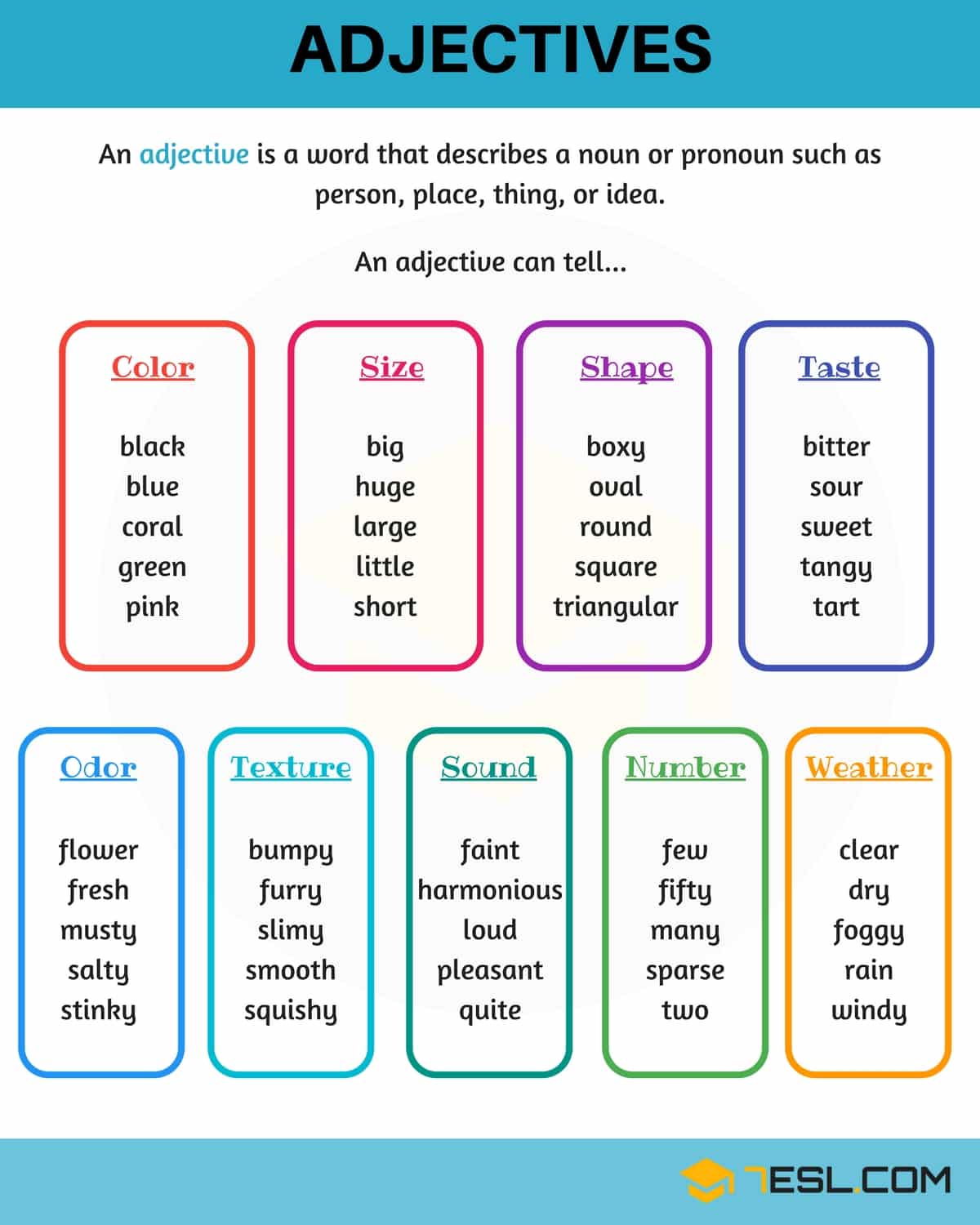
English Adjectives can be identified by their endings. Common adjective endings are as follows:
- -able/-
ible : credible, achievable, gullible, capable, illegible, sensible, remarkable, horrible
- -al: annual, functional, individual, logical, essential
- -
ful : awful, cheerful, doubtful, faithful, forceful - -ic: terrific, cubic, manic, rustic
- -
ive : intensive, adaptive, attractive, dismissive, inventive, persuasive - -less: doubtless, endless, fearless, helpless, homeless, breathless, careless, groundless, restless
- -ous: adventurous, famous, generous, courageous, dangerous, tremendous, fabulous
Though, a large number of adjectives are different…
- hot
- dark
- smart
- cool
- common
- complete
- large
- deep
- thin
- far
atractive - great
doutful - cold
- crowded
- careless
- noisy
- quiet
- real
- pink
- silent
- simple
- strange
- generous
- wide
- young
- …
Types of English Adjectives
In general, two main types of adjectives are
- Descriptive adjectives describe
quality of the noun. While, Limiting adjectives limit the noun being described.
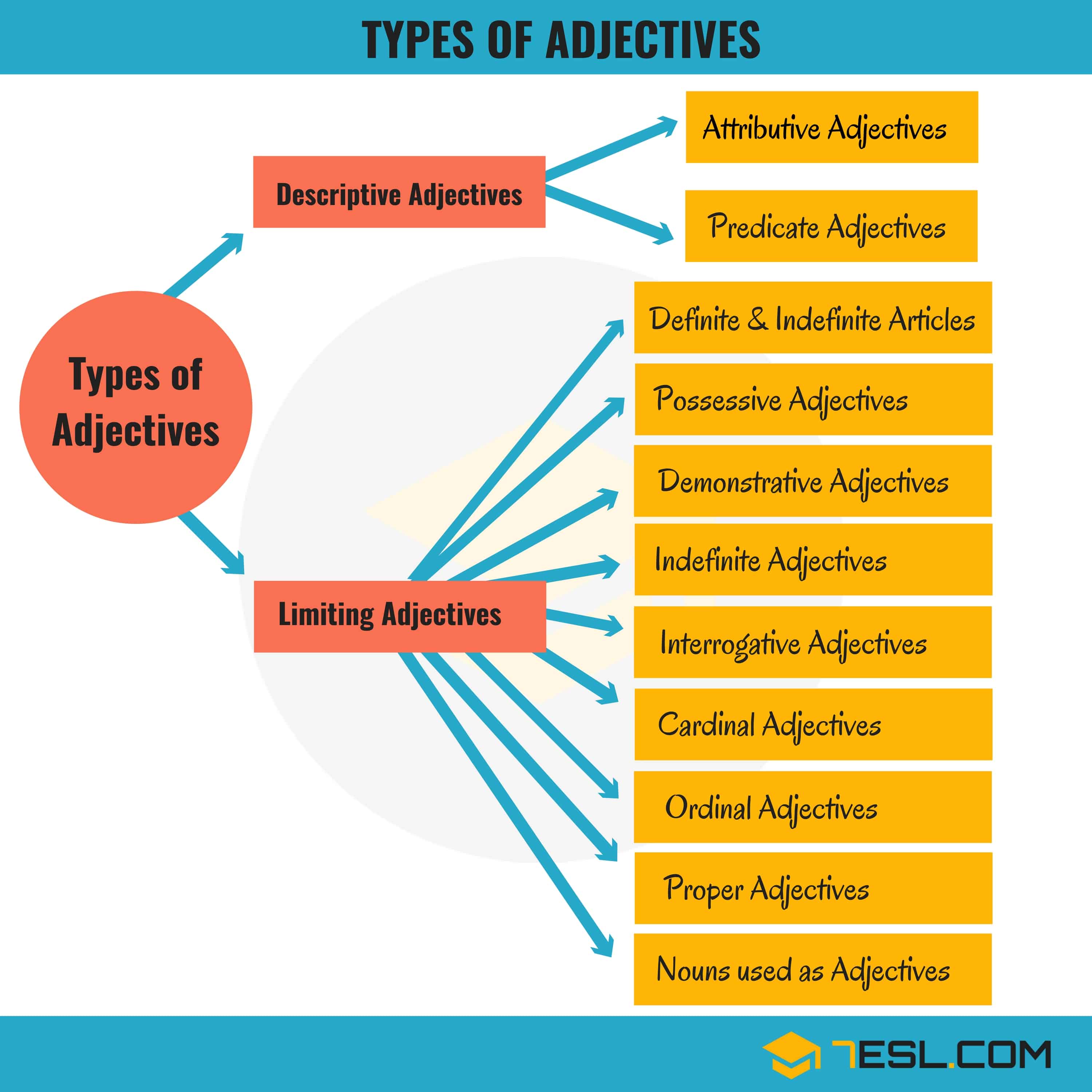
Possessive Adjectives
Possessive adjectives are used to show ownership or possession.
Subject pronouns + verb
Possessive adjectives + (adjectives) + noun
Here is a list of subject pronouns and their possessive adjectives:
- I –
my - You – your
- He – his
- She – her
- It – its
- We –
our - They – their

Demonstrative Adjectives
In English grammar, this, that, these, and those are demonstrative adjectives.
For example
- This school is infinitely better than the last one I went to.
- I think that book is mine.
- These plants are particularly useful for brightening up shady areas.
- Let me give you a hand with those bags.

Order of Adjectives
Learn rules and examples for
In general, the adjective order in English is:
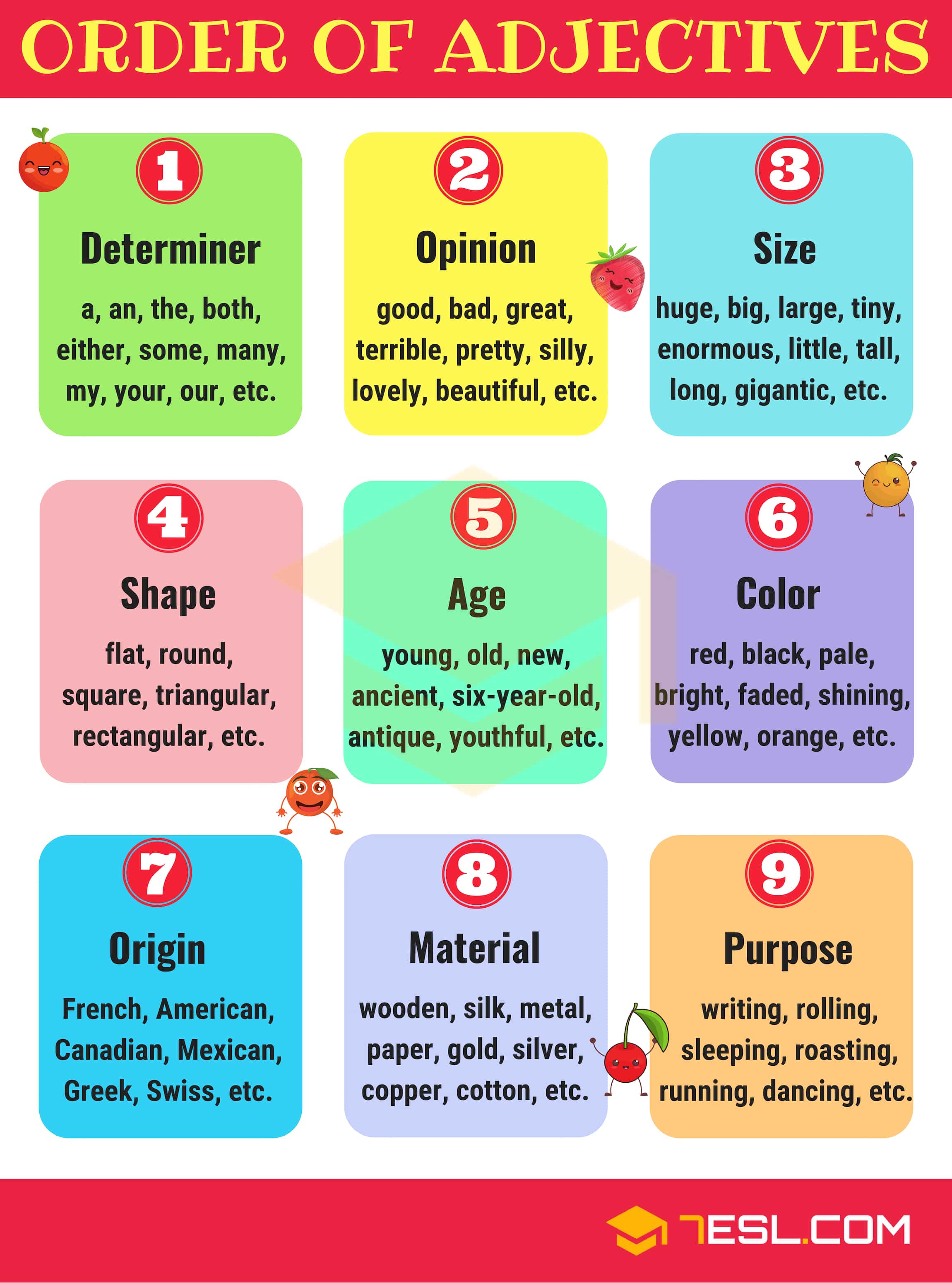
Comparison of Adjectives
Three forms of comparison of adjectives in English
Positive: it is an ordinary form of adjectives
Comparative: shows when two persons or objects being compared
Superlative: indicates that the quality or quantity is at its highest or is most intense
Comparatives
Comparatives are used to compare and clarify the difference between
Learn Comparative Adjectives in English.
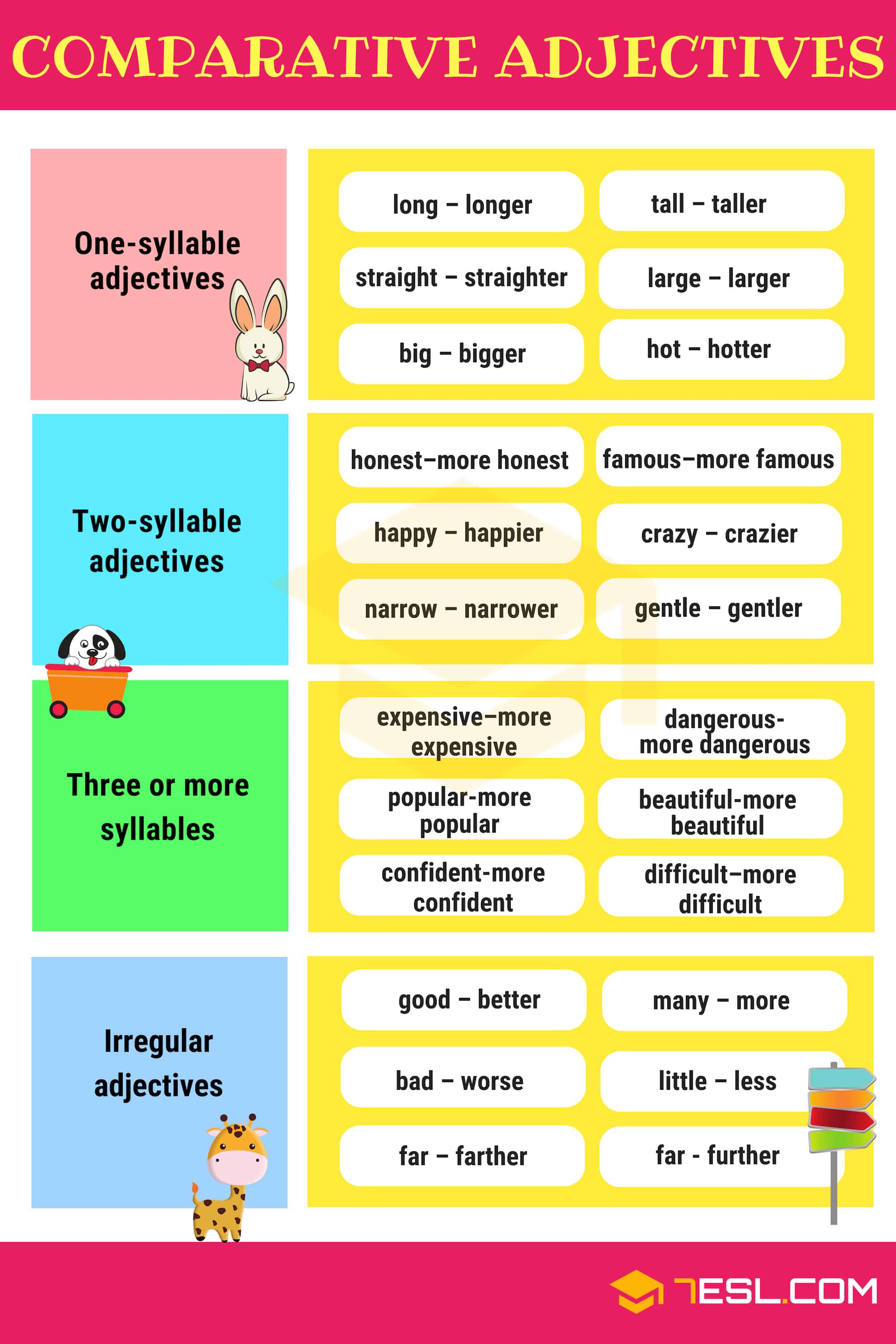
Superlatives
When an adjective compares three or more things, the superlative form of the adjective is used. Superlatives indicate that the quality or quantity is at its highest or is most intense.
Learn Superlative Adjectives in English.

Compound Adjectives
Compound adjectives are adjectives that are made up of two or more words usually with hyphens (-) between them.
Generally, compound adjectives can be formed as follows:
- Adjective + Past participle
- Adverb + Past Participle
- Noun + Past Participle
- Noun + Present Participle
- Adjective + Present Participle
- Adverb + Present Participle
- Noun + Adjective
- Adjective + Noun
- Noun + Noun
- Adjective + Adjective

Adjectives Ending in -ED and -ING
Some adjectives have the characteristic of ending in -ed and -ing.
Learn the difference between Adjectives Ending in -ED and -ING with useful rules and examples.
List of Adjectives Ending in -ED and -ING
- Amazing – Amazed
- Amusing – Amused
- Annoying – Annoyed
- Boring – Bored
- Challenging – Challenged
- Charming – Charmed
- Confusing – Confused
- Convincing – Convinced
- Depressing – Depressed
- Disappointing – Disappointed
- Disgusting – Disgusted
- Disturbing – Disturbed
- Embarrassing – Embarrassed
- Entertaining – Entertained
- Exciting – Excited
- Exhausting – Exhausted
- Depressing – Depressed
- Disappointing – Disappointed
- Fascinating – Fascinated
- Frightening – Frightened
- Frustrating – Frustrated
- Inspiring – Inspired
- Interesting – Interested
- Pleasing – Pleased
- Relaxing – Relaxed
- Relieving – Relieved
- Satisfying – Satisfied
- Shocking – Shocked
- Surprising – Surprised
- Terrifying – Terrified
- Threatening – Threatened
- Thrilling – Thrilled
- Tiring – Tired
- Touching – Touched
- Worrying – Worried

Adjective Suffixes
Learn Common Adjective Suffixes in English.
Common Adjective Suffixes in English
- -al, -
ial , -ical - -able, -
ible - -an, -
ian - -
ary - -full
- -ic
- -
ive - -ish
- -less
- -like
- -y
- -ous, -
ose - -ant, -ent
- -ile
